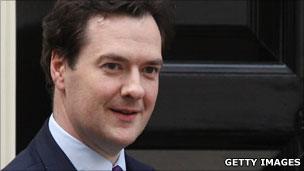Carrying on regardless
- Published
- comments

The chancellor described his spending plan for the UK as 'flexible'
"Have you got a Plan B?" is one of those questions that no politician can answer honestly.
It's in the same category as "Are you considering devaluing the pound?" or "Have you full confidence in your health secretary, prime minister?"
If the chancellor had declared this morning, external that he had a Plan B for the economy or, even, had begun considering one he would effectively have torn up Plan A.
George Osborne also clearly knows that the IMF will give him the thumbs up today. Nevertheless, he did choose to stress that there is "flexibility" built into the government's plans.
Firstly, he declared, the government will allow "the automatic stabilisers" to operate - in other words the government won't cut spending even more or tax more if borrowing goes up because the economy is growing slower than hoped.
Secondly, he pointed out that his plan is to meet what he calls his "mandate" - to eliminate the structural deficit over the lifetime of this Parliament - a year early ie in four years and not five. So, he could slow down a little without the need for a Plan B.
So far, he's under remarkably little pressure to change course. Despite a series of U-turns - from forestry to school books to the NHS - the Treasury has yet to release any extra money to departments.
After their election drubbing the Lib Dems came out against the coalition's own NHS reforms but hardened up their support for the deficit reduction strategy. Today, Vince Cable is due to tell the GMB conference that "like it or not, fiscal policy has to remain tight for the foreseeable outlook".
'Not for turning'
Governments in the middle of their terms do face economic crises or, at least, they usually did until the years of apparently endless boom without bust.
Ted Heath's government made its infamous U-turn in 1972, partly in response to the shock of unemployment reaching one million.
Harold Wilson had to allow the men from the IMF to come in and dictate spending cuts in 1976.
Margaret Thatcher's first government was riven by a row between economic "wets" and "dries". After 364 economists (including the current Governor of the Bank of England Mervyn King) called on her to change economic policy she famously declared "'You turn if you want to. The Lady's not for turning".
Britain crashed out of the European Exchange Rate Mechanism in 1992 which forced John Major to allow the pound to float. His deficit reduction plan to increase VAT on domestic fuel was defeated by a backbench rebellion in 1993. A young man called Cameron was working for the Chancellor, Norman Lamont, who was fired not long after.
So, David Cameron and George Osborne are well aware that a mid-term crisis may be looming if growth remains disappointing and the pressure to spend more increases.
However, they also know that they are still some way from that sort of crisis.